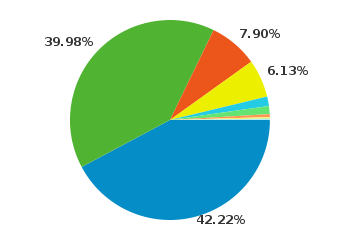How I Make Tough Website Decisions
by Stephen Fluin 2010.08.01I need to make some decisions soon about MortalPowers.com. This includes questions about the appearance, functionality, the focus of my time, and what sort of browsers and codecs I want to support. To answer these questions, I'm going to try to go back to the original question, which is asking myself what are my goals, and why am I building this site.
What is my goal with this website? My goal is to increase traffic, to provide a place for my development projects to live; grow; and be shared, and finally to meet the needs of my visitors.
The last goal is going to be one of the most central, because it will inform the first two. But to answer this question, I need to know as accurately as possible, who are my visitors? I'm going to use the last month as the window and breakdown my traffic from multiple source (Google Analytics and AWStats primarily).
Who visits my site?
Browsers
 Right out of the gate, 8% of my visitors will be unable to view any HTML5 videos. At this point, I'm comfortable instantly dropping the 8% of my visitors that still use Internet Explorer. This is partially a philosophical decision, but it's also in part because most of the people that come using that browser will have no interest in anything I have to say.
Right out of the gate, 8% of my visitors will be unable to view any HTML5 videos. At this point, I'm comfortable instantly dropping the 8% of my visitors that still use Internet Explorer. This is partially a philosophical decision, but it's also in part because most of the people that come using that browser will have no interest in anything I have to say.
 Only about 3% of my Firefox users will be unable to view my Ogg Theora videos. This indicates that Firefox users tend to update their browser relatively frequently. This is great, because Firefox and Mozilla have committed to support to a lot of the technologies I want to use and support.
Only about 3% of my Firefox users will be unable to view my Ogg Theora videos. This indicates that Firefox users tend to update their browser relatively frequently. This is great, because Firefox and Mozilla have committed to support to a lot of the technologies I want to use and support.
Operating Systems
 It seems that a major plurality of my users (45.5%) still use windows to access my site. This is acceptable to me because Windows users can still be interested in Open Source, in software development, or even interested in trying or understanding Ubuntu. I will try to do what I can to support these individuals. As an interesting tidbit, Windows use ends up breaking down as follows for me: 43.9% use Windows 7, 39.22% use Windows XP, and 14.03% use Vista, the rest use Windows Server 2003.
It seems that a major plurality of my users (45.5%) still use windows to access my site. This is acceptable to me because Windows users can still be interested in Open Source, in software development, or even interested in trying or understanding Ubuntu. I will try to do what I can to support these individuals. As an interesting tidbit, Windows use ends up breaking down as follows for me: 43.9% use Windows 7, 39.22% use Windows XP, and 14.03% use Vista, the rest use Windows Server 2003.
Screen Resolution
Less than 7% of my users have screens of 1024 width, everyone else has 1280 or much greater.
What this means for Video
One of the goals that has most recently bubbled to the surface for me is the idea of supporting my video gallery on mobile. I'm continually disappointed with YouTube's mobile site because their video collection is a subset of their full video gallery. Looking at the video support offered by the users of my site, I can cover almost all of my desktop users with Ogg Theora, and until WebM becomes a universal standard, this will be the universal standard. I'm not anticipating WebM to become available across my user base until at least 2012, but time will tell. On mobile, the only option is to use .h264. Based on these competing values, I'm going to attempt to have 2 encodings for each of my videos. I'm not sure yet whether this will mean I have a mobile version of the gallery, or whether I will try to use a single HTML5 video gallery with multiple sources, and I'm definitely open to feedback.
Over the next few months and years, I'm anticipating that mobile usage of my website will grow from the lowly 1% to 20%-50%. Google itself has declared a "mobile first" strategy, and the human workflow of using a phone seems to be much more natural than the bulky process of using a laptop or desktop computer, despite the speed, cost, and additional capabilities provided by desktop computers.
I hate the idea of supporting the .h264 standard, but until WebM is available, I'm going to have to make a decision in favor of my users, rather than in favor of my philosophy that Android and iPhone and Internet Explorer seem to have already rejected. It still makes no sense to me why the mobile phones and Internet Explorer don't at least offer Theora video decoding, since the software is free (as in speech) for them to implement.
permalink
